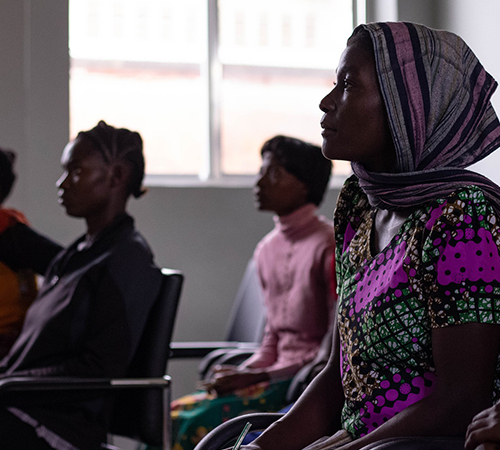Give us a Call: +2347051423739
EMPOWERING WOMEN BY IMPROVING THEIR RESOURCE MANAGEMENT CAPACITY
Financial literacy and management of resources at the grassroots level

This capacity building workshop series promises to provide participating women at the grassroots the tools to manage the resources at their disposal and improve their entrepreneurship.
OVERVIEW
In the 21st century, women enjoy more freedom and power than ever before. However, they are still disadvantaged when compared to men in virtually all aspects of life. Women are deprived of equal access to education, health care, capital, and decision making powers in political, social, and business sectors. Whereas men are credited with performing three quarters of all economic activities in developing countries, women actually perform 53 percent of the work according to the United Nations.
The 1995 UN Human Development Report states that “an estimated $16 trillion in global output is currently “invisible” of which $11 trillion is estimated to be produced by women”.
There is now a recognition of the vital importance of education as a main aspect of human security and as a means to empower women.
According to the UNDP Human Development Report, woman in Africa represent 52 percent of the total population, contribute approximately 75 percent of the agricultural work, and produce 60 to 80 percent of the food. Yet they earn only 10 percent of African incomes and own just 1% of the continent’s assets. These numbers indicate the tremendous challenges women face on their road to gender equality.
Despite repeated efforts made by governments, NGOs and multilateral development agencies, the majority of women in the developing world are still relegated to micro enterprises and informal tasks.
THE NEXT STEP
It is now generally accepted that investment in the economic empowerment of women can and will help reverse these trends: increased income controlled by women gives them self confidence, which helps them obtain a voice and vote in:
- Household decisions such as domestic well-being decision. For instance, woman tend to use income clout for more equitable decisions about sons and daughters’ diet, education and health,
- Economic decisions: acquiring, allocating and selling assets,
- Fertility decisions: economically empowered women tend to have fewer children,
- Female economic power also enhance, the “wealth and well-being of nations”.
PROVISION OF RESOURCES
It is imperative that government and Non Governmental Organisations (NGOs) must work together to marshal the resources that could assist grassroots women to break the culture of deprivation. This institutions, working with bank and multilateral financial institutions are in a position to go the extra mile to guarantee resources at manageable rate to assist women in their small scale enterprises. The effort of the present Ondo State Government in providing credit facilities for market women must be institutionalized for record keeping and progress monitoring.
MANAGEMENT IMPEDIMENT
At this junction, it is crucial that the capacity of these women to manage the resources being put at their disposal be enhanced. Financial literacy has been identified as the one critical impediment even when the resources are available. Grassroots women for improvement in the running of their household and commercial enterprise need the financial know-how to advance from the present situation. The entrepreneurial necessity to make distinction between personal and business finance is an important financial literacy that must be imbibed.
WORKSHOP SERIES OBJECTIVES
1 Introduce participants to the principle of financial management.
2 Illustrate the principle objective of resource management.
3 Highlight the importance of banking and record keeping.
4 Provide participants with the rudimentary tools needed for improved entrepreneurship
METHODOLOGY
1 Resource presentation by highly accomplished financial management experts will be interactive and illustrative
2 Discussion will be geared towards giving participants opportunity to learn practical ways of improving on their financial literacy capacity.
- Resource delivery will be in a form understandable by grassroots women.
- Education, financial skill acquisition, economic empowerment must be understood for what they are in equipping grassroots women with the tool needed for improved quality of life.
WORKSHOP CONTENT
- Financial literacy at the grassroots level as a requirement for improved entrepreneurship; an introductory guide to business management.
- The roles of banks and other financial institutions in advancing a culture of prudent resource management at the grassroots level.
PARTICIPATION
- Participants are organized market women who with the resource assistance provided by the State Government needs the extra financial literacy capacity to entrench sustainable prosperity.
LOGISTICS/EXECUTION
Workshop will be staged in the three senatorial zones to ensure wide spread participation. Preparation is for an average of 500 persons per event.
OTHER DETAILS
DURATION: ONEDAY PER ZONE
SPONSORSHIP:
The Ministry is to decide on the selection and invitation of the target participants across the state.
MANAGEMENT/RESOURCE:
The success of this capacity building workshop is predicated on meeting the requirement test of the need for enhanced women empowerment. We bring to this assignment a valued reputation for structuring workshop that proffer solutions to issues of the day. The resource presentations for these novel topics will be anchored by two very accomplished financial management experts. In the last few years we have had the privilege of coordinating hugely successful workshop for various states across the country.
COMMENDATION
It is an economic imperative for a responsible government to empower the larger half of its population. Women empowerment is now globally acknowledge as one of the last building blocks in our effort to build a more equitable world. We consider this workshop on Financial Literacy and management of resource of the grassroots level as an enabler in the state government’s effort to improve the lot of ordinary women.
